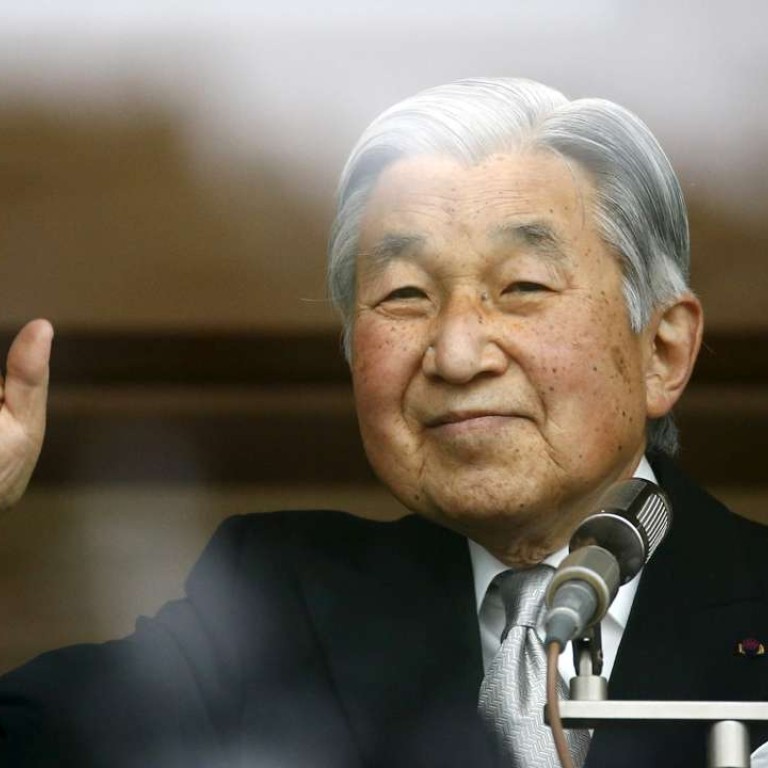
Emperor Akihito intends to step down in the coming years, says Japanese media
Japan’s Emperor Akihito, the first to serve from the outset in a purely ceremonial role, signalled his wish to step down in a matter of years, national broadcaster NHK reported.
The emperor, 82, has reigned for 28 years, after succeeding his father, Hirohito, in 1989.
He would be succeeded by his eldest son, Crown Prince Naruhito, who is 56. NHK yesterday cited unidentified people at the Imperial Household Agency and said the crown prince and other family members accepted Akihito’s wishes.
Akihito’s reign is called the Heisei era – which translates as “achieving peace” – in the Japanese calendar. While Japan also uses the Western calendar, years are traditionally counted from the start of the reign of each emperor. This year is Heisei 28.
Serving in a strictly symbolic role as prescribed by the US-imposed constitution, and the first to marry a commoner, Akihito has been credited with helping modernise Japan’s monarchy. His reign began as the nation was at the zenith of its economic power and just a year before its “bubble economy” burst, ushering in decades of economic stagnation.
“This would be huge because Akihito is enormously popular with the public; he is a voice of reconciliation and looks at dealing with the lingering grievances from the second world war as
his father’s unfinished business,” said Jeff Kingston, director of Asian studies at Temple University in Japan.
“He has done more than all of Japan’s politicians put together in terms of raising Japan’s stature in the region – he is known as the people’s emperor.”
Kingston said it was likely
the decision was driven by the emperor’s advancing age and deteriorating health. Akihito underwent almost four hours of surgery for a successful heart bypass in 2012, and was hospitalised for pneumonia the previous year.

The crown prince served as regent while his father was recovering. The emperor also had prostate surgery in 2003.
In visits across Asia and beyond, Akihito addressed the issue of the past aggression Japan’s military carried out in his father’s name. In 1990, he apologised for Japan’s colonisation of Korea from 1910 to 1945.
Two years later, during the first visit by a Japanese monarch to China, he acknowledged that Japan had “inflicted great suffering” on its neighbour in the first half of the century.
Prior to Japan’s defeat, emperors including Hirohito had been traditionally regarded as living deities, directly descended from the sun goddess Amaterasu. The nation’s people were considered their subjects.
In a speech last year to mark the 70th anniversary of the end of the second world war, Emperor Akihito expressed remorse over his country’s actions.
“Looking back at the past, together with deep remorse over the war, I pray that this tragedy of war will not be repeated and together with the people express my deep condolences for those who fell in battle and in the ravages of war,” Akihito said.
The remarks contrasted with those of Prime Minister Shinzo Abe, who said Japan shouldn’t need to continually apologise.
“It’s not an economic issue but the emperor is very widely respected,” said Robert Feldman, chief economist at Morgan Stanley in Tokyo. “In Japan the notion of the emperor as a symbol of the state is very important. From an economic point of view, it’s very important for social cohesion.”
Emperor Kokaku, who gave up the throne in 1817, was the last emperor to abdicate, NHK said. There is no provision in the Imperial Household Law for such a move, and a legal change is likely to be required.
His successor, Naruhito, is married to a former diplomat, Crown Princess Masako, and has one child, Princess Aiko. Naruhito’s successor would be the son of his younger brother, as women cannot succeed to the throne.
Additional reporting by Reuters

